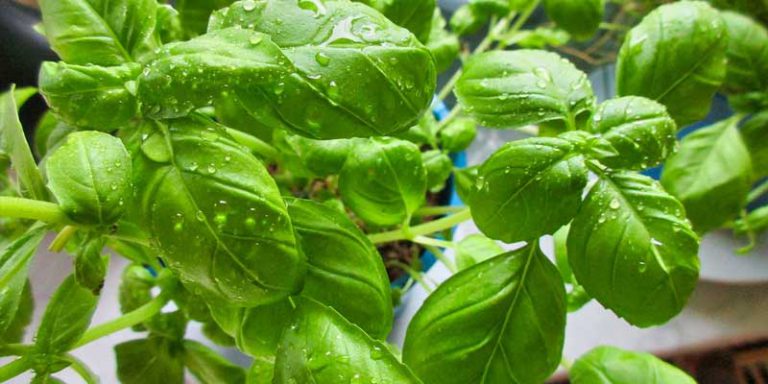Basil is one of the most popular herbs used in cooking. Due to their flavorful taste, these herbs can be used in many dishes. When buying them at the store, you’ll most likely end up buying them in bunches. Like other herbs, they tend to go bad quickly if stored too long. What if you need to keep them longer than a couple of weeks? Can you freeze these herbs in the freezer or not?
Basil leaves can definitely be frozen. This is a great way to store them if you need to keep them fresh for months. However, you’ll need to prep the basil leaves first before freezing them. This will help lock in the flavor, texture, and color of the basil leaves.
Do Basil Leaves Freeze Well?
Like most other herbs, basil leaves will freeze well. This is due to the high content of moisture that’s in the leaves. Frozen basil leaves do have their limit of use when it’s in a frozen state.
If you’re looking to add these herbs to a salad, frozen basil leaves will not work. You’ll end up eating soggy and wet herbs.
For soups, stews, and stir-fry, frozen basil leaves are a great addition. They can be easily added to the meals while it’s being prepared. Basil leaves will add an extra flavor and texture to the food.
How Long Can You Freeze Basil Leaves?
Fresh basil leaves will last 4 to 6 months in the freezer. This is if it’s prepped using the blanching or flash freezing method. Otherwise, basil leaves will last 2 to 3 months.
Whether you used one of the prepping methods or not, basil leaves will still be safe to eat after their shelf life has passed. The basil will decrease in quality, which will affect its taste and texture of it.
The leaves of the basil will be discolored and become lighter green or yellow. The taste will be bland to no taste at all. The longer it’s stored in the freezer, the more the taste and texture will decrease.
Therefore, it’s important to always label the date so you know when to use basil leaves by.
How to Freeze Basil Leaves
There are a couple of methods on how to freeze basil leaves. You can either freeze them as is, use the blanching method, flash freezing, and freeze them as an ice cube.
Whichever method you use, it’s very important to use fresh basil leaves. The fresher they are, the better tasting it is and the longer you can store them in the freezer.
Below are some of the methods to prepare the basil leaves for the freezer:
Quickly Freezing Fresh Basil Leaves
If you’re pushed for time and need to freeze basil leaves quickly, this is the best option. However, it’s not recommended if you’re planning to store basil leaves for longer than 3 months.
- Wash the basil leaves until running water. You’ll want to remove any dirt and bugs that are on the leaves.
- Leave it in a colander or a strainer to let it drip dry.
- After a couple of minutes, take a paper towel and gently pat down the herb. This will help absorb any excess moisture that’s still left on the leaves.
- Pull the leaves off the stems and discard the stem.
- Place the basil leaves into a freezer bag or an airtight container that’s approved for freezer usage.
- If using a freezer bag, squeeze out as much air as you can and seal it tightly.
- Label the bag or container with a date and place it in the freezer.
Blanching and Freezing Fresh Basil Leaves
This is another option for freezing basil leaves. Blanching them first, it will help lock in the flavor and texture of the herb. Blanching basil leaves will also keep them fresh in the freezer longer.
- Once the basil leaves are cleaned, start by picking the leaves off the stem.
- In a pot, add water and heat it until it boils.
- In a tub or container, add water and ice to it. This is what you’ll put them in to cool it down after blanching.
- Place the basil leaves into a colander or strainer.
- Drop the colander with the herbs into the boiling water.
- Blanch them for 15 seconds. If you have a basket full of basil leaves, you can blanch them for 20 seconds.
- In the container or ice water, immediately place the herbs in there for 2-3 minutes or until it’s completely cooled.
- Once it’s completely cooled, take the herbs out and let it sit for about 10 minutes to drain the water out.
- Take a dry paper towel and gently pat the basil leaves to remove any excess water.
- Once they are dried, place them into a freezer bag.
- Try to squeeze out as much air as you can and seal the bag tightly.
- Label the bag with a date and place it in the freezer.
Flash Freezing Fresh Basil Leaves
Flash freezing basil leaves are a great method to prepare the herbs for the freezer. This is an excellent choice if you use a lot of basil in your cooking. Since they won’t stick to each other while in the freezer, take as much as you need from the freezer bag and put the rest back in the freezer.
- Start by cleaning the basil leaves with water.
- Let it sit for about 15 to 20 minutes in a colander for the water to drip. To make the drying process quicker, use a paper towel, and gently pat it down.
- While it’s drying, on a clean tray, lay a sheet of baking paper or wax paper.
- Once it’s completely dried, pick each leaf off the stem and place it on the tray. Even space them out so they don’t touch each other.
- After the tray is full, place it into the freezer for about 20-30 minutes.
- Once the basil leaves are completely frozen, take them out of the freezer.
- In a freezer bag, immediately transfer it to the bag.
- Squeeze out as much air as you can and seal the bag tight.
- Label the bag with a date and place it back into the freezer.
Freeze Basil Leaves in Ice Cube Trays
This is a great way to store basil leaves in the freezer. By freezing them as ice cubes, they can easily be added to any dish or food right away.
- Make sure the basil leaves are completely clean.
- Take a couple of basil and roll them together.
- Dice up the basils finely or how small or large you want them to be.
- In the ice cube tray, fill the basils up halfway in each slot.
- Top off its slot with fresh clean water. For added flavors, you can use olive oil.
- Take a cling wrapper and wrap the entire tray.
- Place it into the freezer until it’s frozen.
- Once it’s completely frozen, remove the ice cube tray from the freezer.
- Immediately transfer all the ice cubes into a freezer bag.
- Squeeze out all the air and seal the bag tight.
- Label it with a date and place it into the freezer.
How Do You Defrost Basil Leaves?
Like most other herbs, basil leaves don’t need to be defrosted. Due to their small size, they can be easily added to a meal while it’s being cooked. It should melt right away once it’s mixed with other ingredients.
This applies to basil leaves frozen as ice cubes as well. Ice cube basils are great for making dipping sauces, adding flavors to soups and stews, and other meals.
Therefore, it’s best to leave basil leaves in the freezer until you’re ready to use them.
Can Frozen Basil Leaves Go Bad?
Frozen basil leaves can go bad if you let them thaw too long or if it’s left in the freezer for a prolonged time.
When basil leaves start to thaw, they will become soggy and soft. This is due to the high content of moisture in the leaves when it’s frozen. If the herb is completely thawed and it’s not used within a couple of hours or so, it will start to bad. The basil leaves will be in a puddle of melted water.
In the freezer, if the basil leaves are left too long in there, they will go bad as well. This is mostly due to the basil leaves getting freezer burn. Basil leaves will stay fresh for up to 6 months. Once it has passed that time, the quality of it will slowly start to decrease. Usually, after a year, the basil leaves will longer be no good to eat or use. The quality of it will degrade to the point where you’ll just end up eating something that has no flavors.
Related Questions
Can you freeze greek basil?
Greek basils can be frozen and they will freeze very well. This is due to their leaves being smaller than regular basil leaves. Therefore, it’s better to freeze them as ice cubes.
Can you freeze basil oil?
Basil oil stores perfectly fine in the pantry, but if you want to store them in the freezer, they can be frozen too. However, for basil oil, you’ll want to freeze them as ice cubes.


